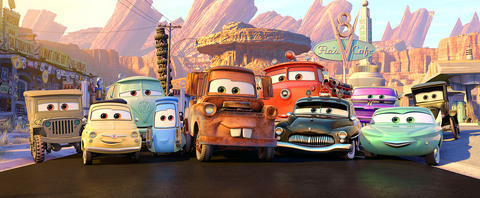Every 18 months or so, Pixar brings out a film to remind the makers of other computer-animated films how action scenes are done.
The Emeryville animation studio's latest entry, Cars, starts with a brilliant sequence on a NASCAR-like race track. Wheel's-eye views offer a visceral sense of the automobiles' power. Some shots zoom right up to bumpers of cars traveling at breakneck speed.
Directed by Pixar creative mastermind John Lasseter, Cars adds plenty of warmth and sweetness to its visual wizardry. This film should please children and parents alike, though both probably will notice the picture's slow middle laps.

During the opening sequence, hotshot Lightning McQueen (voiced by Owen Wilson) rounds the track without heeding warnings from his pit crew that he needs to stop for service. Like the crew members, Lightning is mechanical.
Having gone human and super-human in its last film, The Incredibles, Pixar abandons people altogether in Cars. Adoring female fans are Miatas, and tail-gate partiers outside the stadium are talking RVs.
In a world populated by vehicles, looks count. After the race, Lightning is wary of visiting the tent of his lower-tier corporate sponsor -- the makers of a rust-removing product -- because he knows the fans who use the product will be there. In Cars, rusty vehicles are the unwashed masses.

PHOTOS COURTESY OF BVI
Though cocky and snobbish, Lightning is never unlikable. Wilson's delivery, often slightly unsure or questioning, lets us know that Lightning's arrogance can easily be deflated.
For a self-centered show-off like Lightning, there's nowhere to go but a small town where he will discover the emptiness of his value system as well as his tank. There's a recognizable formula in Cars, and it's not Formula One.
A freeway mishap leads Lightning to Radiator Springs. The one-time jewel of Carburetor County, the town has experienced hard times since the freeway siphoned traffic from Route 66.
After drawing the attention of the local fuzz, Lightning appears before the town's judge, a 1951 Hudson Hornet lent Paul Newman's gruff authority. Lightning is sentenced to community service, and more specifically, to repaving the community's main road.
Despite the town's depressed economy, the local merchants are vibrant and hopeful. A hydraulics-happy lowrider, voiced by Cheech Marin, wants to customize every vehicle he meets. A VW bus, given hippie-mellow voice by George Carlin (Tommy Chong apparently wanted too much money), touts the benefits of organic fuel.
Radiator Springs also features an obligatory character for any film or TV show about a small town: the smart, sophisticated, attractive young person who is unusually attached to his or her hamlet. In this case she's Sally Carrera, a Porsche, lawyer and one-woman Chamber of Commerce voiced by Bonnie Hunt. Lightning's innocent love interest, she's the Gilmore girl of Cars.
Though ostensibly the second leads, Newman and Hunt don't get many chances for animated glory. The judge carries an intriguing secret, but his subplot is never explored to its full potential. A former hotshot lawyer in Los Angeles, Sally mostly helps teach Lightning to take things more slowly.
The idea of stopping to smell the roses won't much register with kids. Four-year-olds so rarely get caught up in the rat race. But adults will appreciate the message.
And both will enjoy Mater, the tow truck that gives this story much of its heart and humor. Voiced by Larry the Cable Guy, the truck goes heavy on the rust and "Hee Haw" accent, which helps explain why his name is short for "tomato." An instigator of late-night shenanigans, he's also a great pal to Lightning, teaching the spoiled race car that rusted-out tow trucks are vehicles, too.
But Lightning's learning process lasts too long. Cars includes several moments in which Lightning is told he's a high-performance lout, when the audience already has caught on.
Scenes evoking Radiator Springs' heyday offer reminders of a time when a sense of community created by local businesses outweighed the convenience of freeways and Wal-Marts. Cars evokes a bygone American era while reminding us that it doesn't necessarily need to be bygone.
Offering a level of entertainment value as old-fashioned as its film's messages, Pixar includes a delightful short film, One Man Band, before the feature, as well as some fun scenes that run with the credits. Also included with the credits is a tribute to Cars co-director and co-writer Joe Ranft, the animation-film veteran who died last year in a car crash.

The canonical shot of an East Asian city is a night skyline studded with towering apartment and office buildings, bright with neon and plastic signage, a landscape of energy and modernity. Another classic image is the same city seen from above, in which identical apartment towers march across the city, spilling out over nearby geography, like stylized soldiers colonizing new territory in a board game. Densely populated dynamic conurbations of money, technological innovation and convenience, it is hard to see the cities of East Asia as what they truly are: necropolises. Why is this? The East Asian development model, with

June 16 to June 22 The following flyer appeared on the streets of Hsinchu on June 12, 1895: “Taipei has already fallen to the Japanese barbarians, who have brought great misery to our land and people. We heard that the Japanese occupiers will tax our gardens, our houses, our bodies, and even our chickens, dogs, cows and pigs. They wear their hair wild, carve their teeth, tattoo their foreheads, wear strange clothes and speak a strange language. How can we be ruled by such people?” Posted by civilian militia leader Wu Tang-hsing (吳湯興), it was a call to arms to retake

This is a deeply unsettling period in Taiwan. Uncertainties are everywhere while everyone waits for a small army of other shoes to drop on nearly every front. During challenging times, interesting political changes can happen, yet all three major political parties are beset with scandals, strife and self-inflicted wounds. As the ruling party, the Democratic Progressive Party (DPP) is held accountable for not only the challenges to the party, but also the nation. Taiwan is geopolitically and economically under threat. Domestically, the administration is under siege by the opposition-controlled legislature and growing discontent with what opponents characterize as arrogant, autocratic

Desperate dads meet in car parks to exchange packets; exhausted parents slip it into their kids’ drinks; families wait months for prescriptions buy it “off label.” But is it worth the risk? “The first time I gave him a gummy, I thought, ‘Oh my God, have I killed him?’ He just passed out in front of the TV. That never happens.” Jen remembers giving her son, David, six, melatonin to help him sleep. She got them from a friend, a pediatrician who gave them to her own child. “It was sort of hilarious. She had half a tub of gummies,